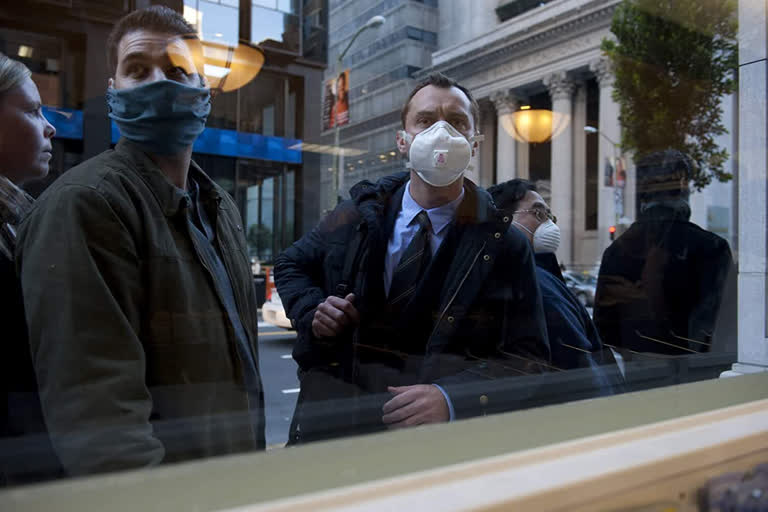Hyderabad: When Contagion hit the screens in 2011, with its black opening scene and a rasping cough, it seemed Steven Soderberg's imagination had finally run its course. Released on September 9, ten years after 9/11 brought terror home to America, the film showed empty airports, garbage-strewn streets, panic buying in stores, a one touch transmission emanating from China, causing a one instant infection.
It was the stuff of nightmares -- a mother's embrace could become toxic and a lover's peck a kiss of death. But now call anyone and the rasping cough is the ringtone that greets you. Go anywhere to buy your groceries and if there were no advisories people would be falling over each other to buy essentials. As for airports, who has been to one lately? And yes, there is no vaccine and no treatment protocols.
But then when it comes to Hollywood, reel life has always been ahead of reality. In 1995 it got Dustin Hoffman and Morgan Freeman to go to battle to save a town from being eviscerated for being a threat to humanity because it was home to a deadly flu. It created a waterless dystopia in Mad Max: Fury Road in 2015 by the time climate change had begun to hit home And it adapted Margaret Atwood's The Handmaid's Tale in 2016 just in time to see a misogynistic president who would all too happily suspend the Constitution if he could.
It taps into our deepest fears and our darkest fantasies. So it's no surprise that Hollywood has global revenues of over $ 42 billion and over $30 billion of it of its revenue comes from out of America, making it a truly international superpower. Its abilities to take our most intimate anxieties and expand them into high art is stupendous. Take Children of Men (2016) directed by Mexican maestro Alfonso Cuaron. It's the story of a world where a virus has rendered women infertile and there is no hope left--except a young woman who becomes pregnant and has to be taken to safety among rampaging mobs.
Read: PM Modi's seven guidelines to help fight COVID-19
Rage is a major motif in 28 Days Later's (2002) dystopian world of tomorrow whether it is the post apocalyptic world Cillian Murphy's man-in-a-coma wakes up to with humans infected by an anger virus. Anger is what bubbles under the surface in Blindness (2008) based on Jose Saramago's brilliant novel of a world infected by a blindness virus. Again here too, women have to make the ultimate sacrifice of sex--the blind men in charge of food will give it only in exchange for sex.
Humanity has been at its worst in recent times, elected leaders without empathy, discriminating against people based on their identities, be it religion, caste of gender, and increasingly retreating from communities that share to gated enclaves where it is each individual to himself. So increasingly movie villains have transformed too. From big governments that caused wars and terrorist organisations that inflicted death, even movies have figured out that our greatest fears lie within ourselves.
But the lesson from the pandemic movies is clear: as much as the epidemic makes us enemies of each other, keeping our careful social distance, it also brings us together. No one can fight an invisible enemy by oneself. It takes teamwork and collaboration. Policy without context is meaningless. If the disease is cured but people die of starvation then it is not a triumph of human spirit but a defeat of all that is noble and humane. As one of India's premier virologists Shahid Jameel says: "This virus will hit rich and poor, royal and commoner alike. It is a great leveller. It is inclusive -- does not discriminate based on religion, caste, economic status, gender."
Read: 'A to Z corona Pathsala' -- where even PM got lesson
Aashiq Abu's Virus (2019), a Malayalam movie which had the finest stars from that region, echoes precisely this in what is a pulsating medical thriller based on the real life Nipah outbreak in 2018. From KS Shailaja Teacher (in the movie she becomes CK Prameela and is played by Revathy) to the doctors and nurses of the Kozhikode hospital where it was first discovered to the state bureaucrats, the film chronicles how an alert public health system can respond to an emergency in time. It also showed the power of working together, something India is realising belatedly as state governments work in tandem with NGOs, philanthropic corporates and generous individuals.
When Deepa Mehta was promoting Netflix's mini series Leila last year, of which she was creative director, she said, "We are all Shalini now," of the main protagonist who lives a comfortable middle class entitled existence in an increasingly waterless world of walled enclaves, drinking Evian and wearing Vogmasks like us. That was a dystopia, based on Prayaag Akbar's book, which was all too real, blending a war on nature with a war on women's wombs.
In Leila, the world is never the same again. In reality, the universe still has time.
(Kaveree Bamzai, a recipient of the Chevening Scholarship has formerly worked with The Times of India and The Indian Express and has been the editor of India Today. She is also a member of the CII National Committee for Women's Empowerment and Committee on Media and Entertainment)



